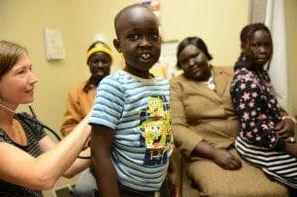Gaps identified in refugee health
Refugees are experiencing worse health outcomes, including higher levels of diabetes, kidney disease, stroke and dementia, than the general Australian population, a new study has found.
 The ‘Health of refugees and humanitarian entrants in Australia’ study, released by the Australian Institute of Health and Welfare (AIHW), found that among hospitalisations for refugees one in 14 were for potentially preventable diseases.
The ‘Health of refugees and humanitarian entrants in Australia’ study, released by the Australian Institute of Health and Welfare (AIHW), found that among hospitalisations for refugees one in 14 were for potentially preventable diseases.
“Refugees and humanitarian entrants are, however, more likely to self-report certain long-term health conditions, including diabetes (80 per cent higher), kidney disease (80 per cent), stroke (40 per cent) and dementia (30 per cent) than the rest of the Australian population,” the report said.
“Compared to the rest of the Australian population and when adjusted for age, refugees and humanitarian entrants are less likely to self-report asthma and cancer (both 60 per cent lower), chronic lung conditions and mental health conditions (both 50 per cent lower).”
The report looked at the health outcomes, health service use and causes of death for refugees and humanitarian entrants who arrived in Australia from 2000 to 2020.
“Good health is vital for refugees and humanitarian entrants to settle in Australia and rebuild their lives through social, economic, and cultural opportunities,’ said AIHW spokesperson Vanessa D’Souza.
“The experiences of refugees and humanitarian entrants prior to their arrival in Australia can have a significant impact on their health outcomes. Understanding patterns of health outcomes and service use is important to identify gaps in accessing appropriate health care, and to inform the design and delivery of health care and settlement services.”
Almost 9 in 10 refugee and humanitarian entrants had a GP consultation in 2021, with almost all (around 99 per cent) bulk-billed.
The report says a reason why bulk-billing may be higher in this population was that a large proportion lives in areas where bulk-billing rates are high.
Refugees and humanitarian entrants who arrived within the last 5 years had a slightly higher rate of GP attendances than those who arrived more than 10 years ago (9.5 attendances per person compared with 8.8 attendances per person).
Between 2007 and 2020, the mortality rate among refugees and humanitarian entrants were 2.4 times as high for accidental drowning and 1.5 times as high for liver cancer when adjusted for age, the study found.
Researcher Abela Mahimbo, of the University of Technology Sydney, said compared with the rest of the population, refugees in Australia are at a higher risk of physical and mental health issues that are complex, interrelated and interconnected.
She said people fleeing persecution are more likely to have experienced significant human rights violations, torture and trauma, which impacts their mental health and wellbeing.
“While in exile, they are also likely to have experienced precarious living conditions with limited access to water, sanitation and hygiene, as well as food insecurity and limited access to basic health care,” Dr Mahimbo said.
These can lead to significant health issues, including: mental illnesses; nutritional deficiencies; infectious diseases; under-immunisation; poor oral and eye health; poorly managed chronic diseases, and; delayed growth and development in children.
These conditions may require immediate care or long-term management – or both.
Dr Mohimbo said gaps that lead to inferior health outcome for refugees included language barriers, a lack of health literacy and continuity of care.
“Patients from refugee backgrounds can fall through the cracks when services are not well coordinated or can’t be followed up,” she said.
“For example, Australia’s National Immunisation Program schedule for children is very comprehensive compared with other countries. But many childhood vaccinations require multiple doses over time. When the need for follow-up appointments is not communicated properly – or recall systems aren’t culturally appropriate – they may be missed,” Dr Mohimbo said.












